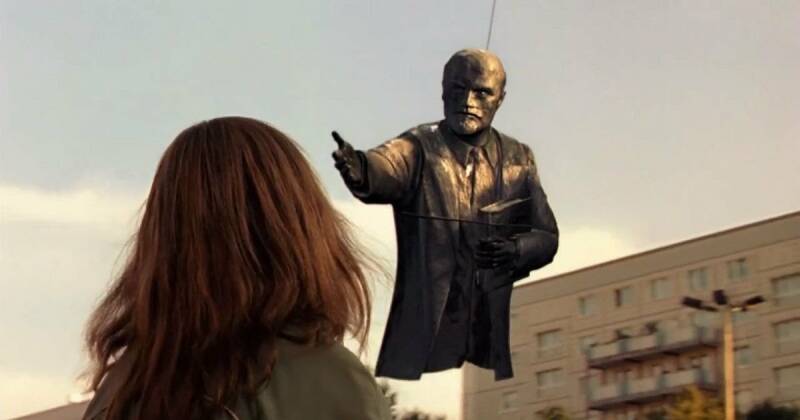
Director: Wolfgang Becker
Starring: Daniel Brühl, Maria Simon, Katrin Saß, Chulpan Khamatova, Florian Lukas
Music: Yann Tiersen, Claire Pichet
Cinematography; Martin Kukula
Screenplay: Wolfgang Becker, Bernd Lichtenberg
Fact: Germany's most profitable-ever film
Time: 121 minutes
In one line: A loving family tries to recreate the 'East Germany experience' for their ailing mother
Summary
Christiane (Simon) puts all of her efforts into being an East German patriot and party member when her husband absconds to the West. When she sees her son Alex (Brühl) attacked and beaten by riot police during a peaceful demonstration, she falls into a coma. During her coma, the Berlin Wall is demolished and Germany is reunified. When Christiane awakes, a doctor tells Alex and his sister Ariane (Saß) that Christiane's heart is weak and that any sudden shock may kill her. Alex thinks that the obliteration of her beloved DDR will be too much for Christiane and sets about re-creating the old East Germany for Christiane's limited-mobility world. Christiane's old apartment is re-furnished as it was before the revolution and with the help of his friend Dennis (Lukas), he sets about re-creating East German TV for his bed-bound mother. Unfortunately, for Alex, there are many secrets yet to unfold and there is always the chance that someone will lift the veil on Christiane's artificial world....
Commentary
Goodbye Lenin! trades on the German sense of nostalgia known as 'ostalgie', a particularly East German trait that looks back on the pre-unification days as being not-so-bad-after-all. The film examines the good things of the pre-1989 East Germany - particularly full employment - and shows that we can always look back on things with our rose-tinted specs just so long as there were families and lovers and friends who were there with us too.
The film's central conceit of the re-created retro world becomes very silly, very quickly, and weakens the film's love v political ideology theme, but it allows the writers and director the chance to remind the world of some of the simplicities of pre-1989 life. Alex goes on the hunt for an obsolete brand of pickled gherkin when his mother develops a craving, and has to rifle through bins to find the old jars before he can re-pot an alternative brand to keep his mother convinced. There's also a lovely little scene where Alex sits with his newly-acquired step-family and watches old East German children's favourite 'Sandman' being watched and loved by a new generation.
There is a recurring theme/motif of rockets and space travel throughout the film. The opening scenes show East German cosmonaut Sigmund Jahn co-opted onto a Russian space mission. We later see the older Jahn (Stafan Walz) working as a mini-cab driver after the wall has fallen and this is one of the many examples of how many East Germans fell from importance once the structure of the DDR had been dismantled. Alex's sister Ariane (another space-related reference) goes from university researcher to Burger King employee (and is much happier) but many other, older workers are simply thrown on the scrapheap once the state will no longer provide guaranteed employment. The final scene of the film brings the idea of rockets and space travel full circle, and there's a clever ironic twist to the whole proceedings.
There is much to admire in the film. Brühl and Simon are tremendous and there's a gentle melancholic feel to the film enlivened by many funny but touching moments. Christiane's understanding of the changing world is revealed in a fabulous scene where she leaves her sick bed and walks into Berlin for the first time since her coma. The shots of the 'Flying Lenin' are breathtaking and particularly poignant.
A great film and highly recommended.
9/10
